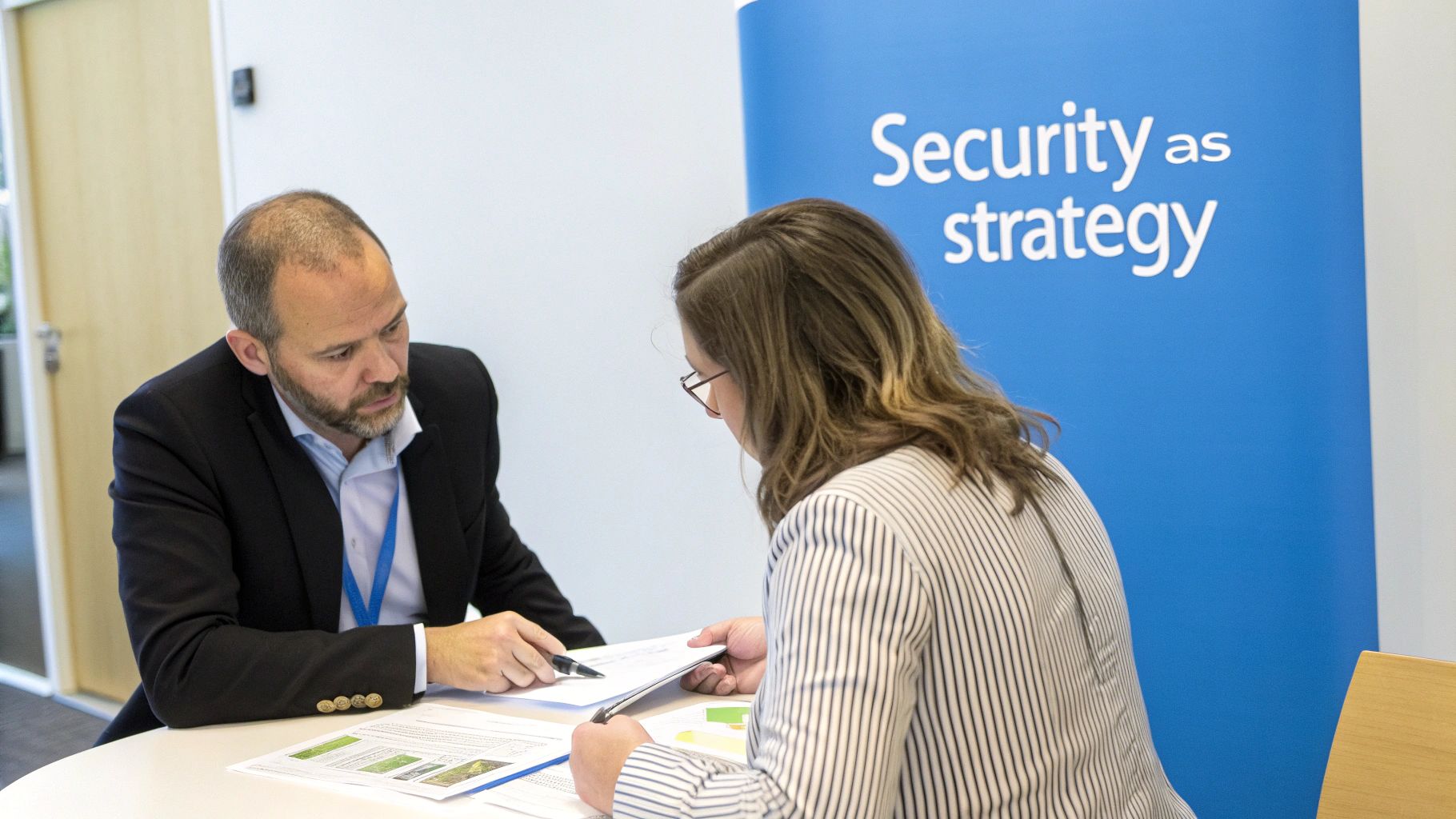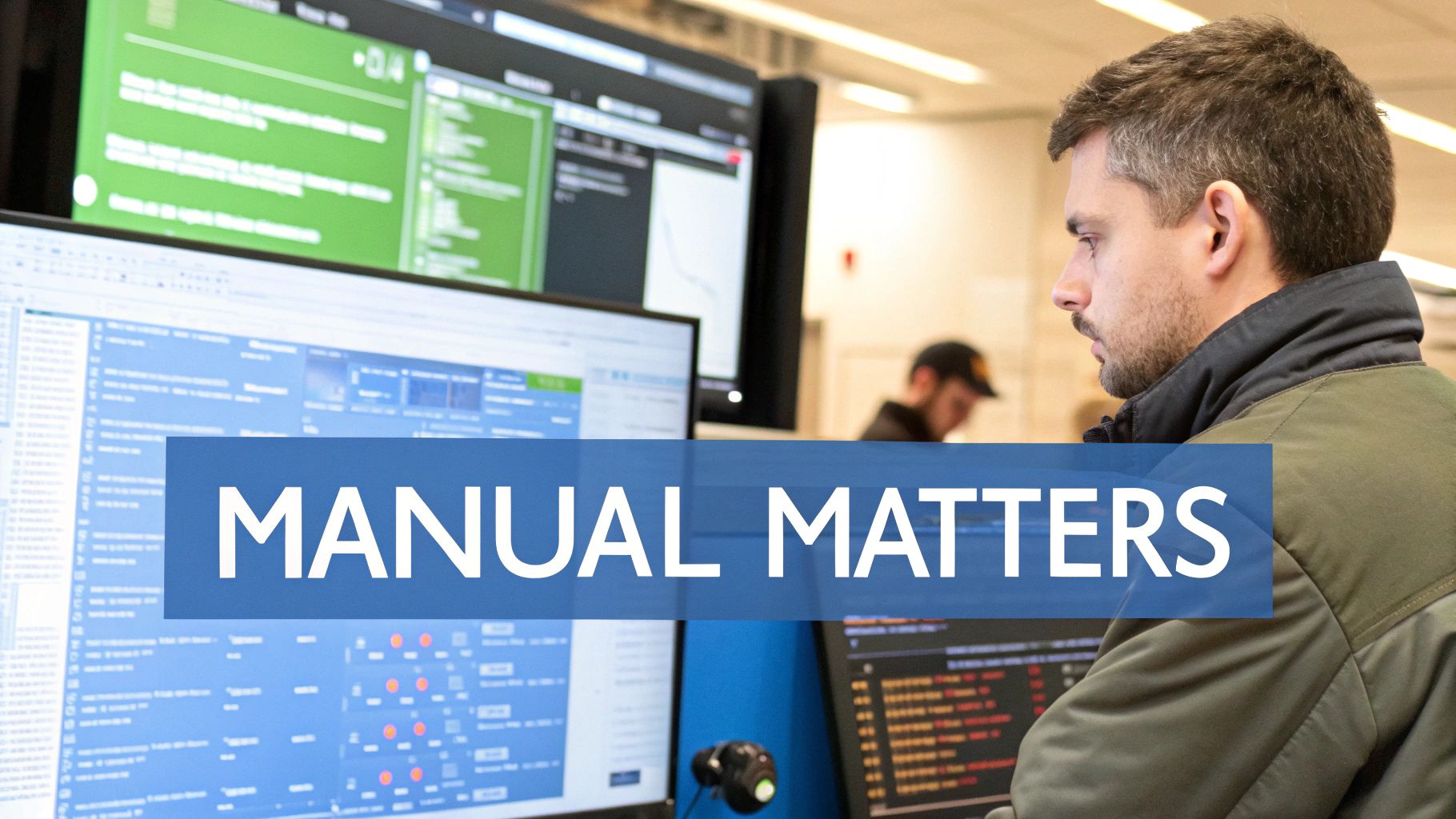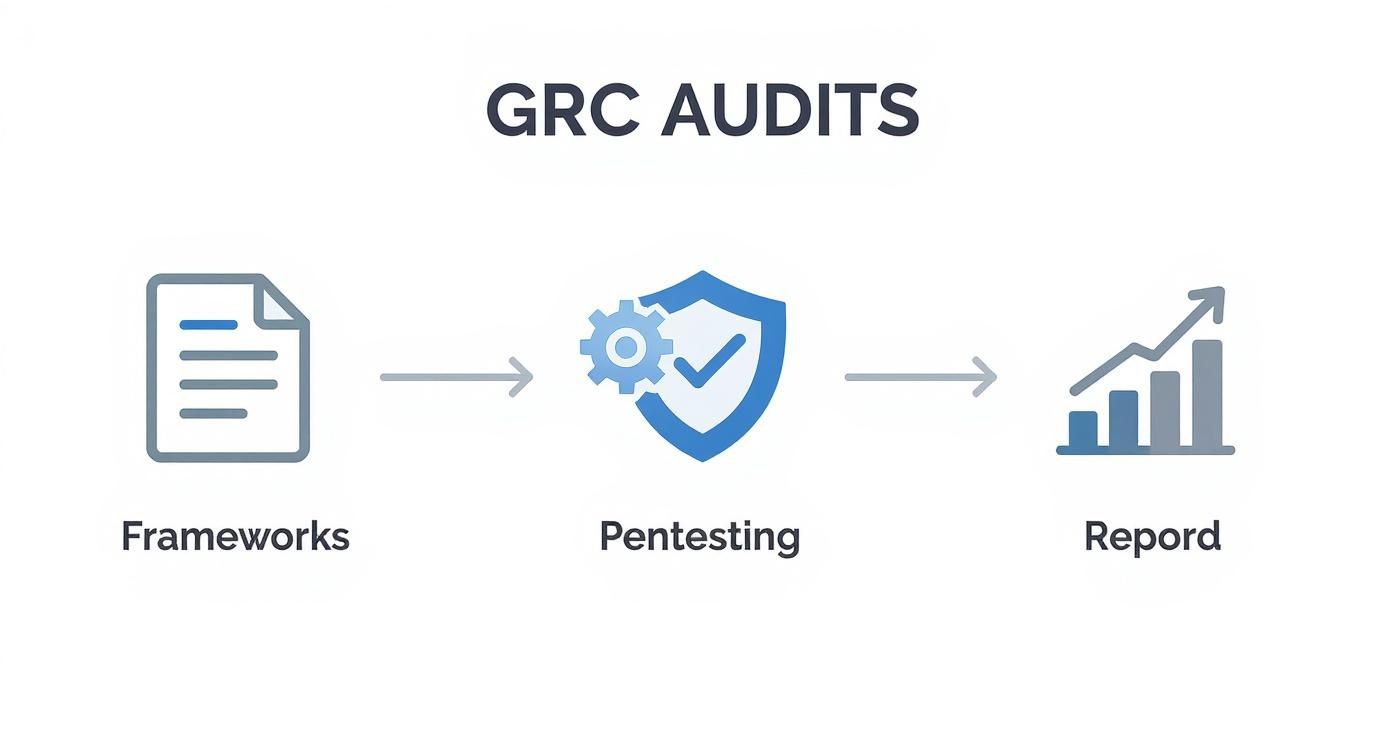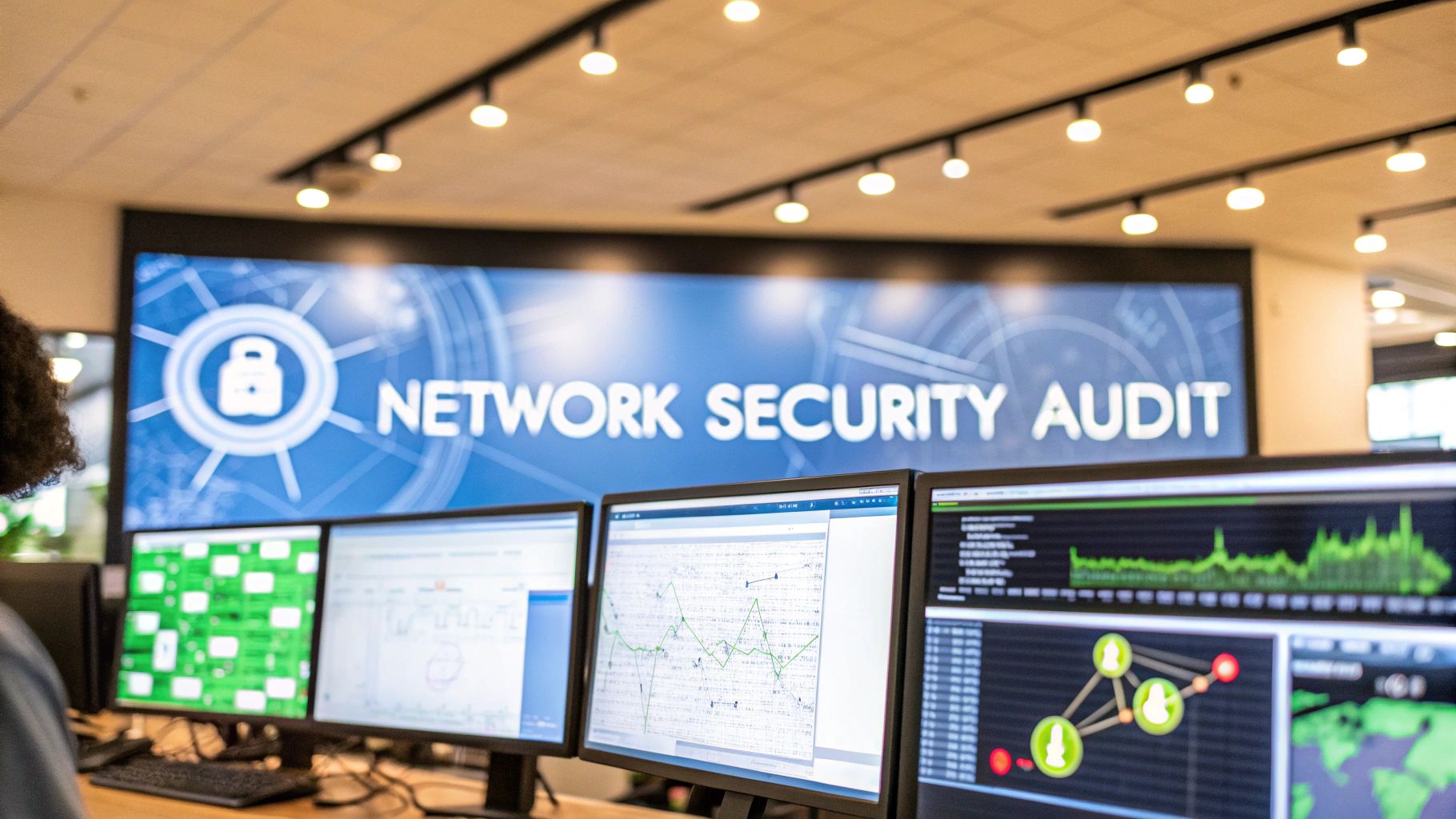A network security audit is a full inspection of your client's IT setup. Think of it like a home inspector checking every nook and cranny, but for their digital world. We're looking for security holes, weaknesses, and anything that doesn't meet compliance rules. For an MSP, this isn't just another service—it's how you prove your value and protect your clients.
Why MSPs Need Network Security Auditing

For any MSP, vCISO, or GRC company, offering a network security audit is no longer optional. It’s a core part of the business. Just managing IT isn't enough anymore; you have to defend it. Regular audits are your best tool against cyber threats and the best way to keep your reputation safe. A strong security offering helps you win and keep great clients.
When you show a client a professional manual pentesting report, you’re not just selling a service. You’re selling them peace of mind. This is a game-changer for clients who need to meet standards like SOC 2, HIPAA, or PCI DSS. For them, a detailed risk assessment backed by a real penetration test is a must-have to stay in business.
Turning Audits Into a Growth Engine
An audit is a business investment, not just an expense. A real penetration testing audit helps you build trust by proactively managing your client's risk. The findings also create new opportunities for projects and services. You become their go-to security advisor, not just another vendor.
The cybersecurity audit market is growing fast, expected to hit USD 20.2 billion by 2032. This growth is driven by rising cyber threats and strict compliance rules. You can see more cybersecurity audit market trends from DataIntelo.
The Problem With The Old Model
Many resellers in the compliance and managed service industry face the same problems. They deal with inflated prices, confusing testing methods, and long wait times. That old model makes it tough to deliver the fast, affordable value your clients expect.
This is where a true channel-only partnership changes everything. You can offer high-quality, white label pentesting without ever worrying about your partner competing with you. You get the skills of certified pentesters with top certifications like OSCP, CEH, and CREST, making them a natural part of your team. This is how you solve your clients' security headaches for good.
Automated Scans Versus Manual Pentesting

It’s easy to mix these up, but a vulnerability scan and a true network security audit are very different. A scan is like a spellchecker for your network—it’s fast and catches common mistakes. It's a good first step, and you can learn more about vulnerability scanning in our detailed guide.
But a spellchecker can't tell you if your story is good. That’s where manual pentesting comes in. A real human ethical hacker with certifications like OSCP or CREST thinks like an actual attacker. They don't just look for known flaws; they get creative to find a way in.
Why Automated Tools Always Fall Short
Automated scanners are fast. They check your systems against a big list of known problems and give you a report. The issue is, they create a lot of noise with false positives, leaving your team to figure out what’s a real threat.
More importantly, these tools can't understand business logic. A scanner doesn't know how an application is supposed to work, so it misses how an attacker could misuse its features. This is where the biggest risks often hide.
The Unique Power Of Human Expertise
A manual penetration testing engagement goes much deeper. Our certified testers do what scanners can't. They link small, low-risk issues together to create a major attack. They move through the network, gain more access, and find the tiny mistakes that lead to a full breach.
This human-led approach is required for meeting compliance frameworks like SOC 2, PCI DSS, and ISO 27001. Auditors know a simple scan report isn't enough. They want to see proof of serious, hands-on testing. While automated scans find easy targets, manual pentesting uncovers complex attacks.
For an MSP or vCISO, a manual pentest report shows you’re serious about security. By partnering with us, you get affordable, fast, and high-quality manual testing that you can offer as your own through our white label pentesting service.
Integrating Audits Into Your GRC Services
If you're a vCISO or run a GRC firm, network security audits are the foundation of your work. Bringing manual pentesting into your services is the best way to prove your clients' security controls actually work. This is a must-have when they face frameworks like SOC 2, HIPAA, and PCI DSS.
A good audit provides the real-world data needed for a solid risk assessment. It turns a theoretical checklist into a practical search for the exact vulnerabilities that cause a breach. This is the evidence clients need to get certified.
How Audits Create A Strategic Roadmap
The real value of a network security auditing report isn't just a list of problems; it's the action plan it creates. The findings from a manual pentest feed directly into your client's risk management process. This helps you prioritize fixes based on their actual business impact, not just a generic score from a scanner.
This approach strengthens your GRC services. You are no longer just helping clients check boxes. You're guiding them on a real security improvement journey, backed by proof from expert human testers. For businesses working on their security, understanding ISO 27001 certification is a huge step, and that framework is all about this cycle of testing and improving.
Strengthening Your Brand With Pentesting
Working with a channel-only provider for white label pentesting lets you deliver this expert service under your own brand. You get the credibility of a report from certified professionals—with OSCP, CEH, and CREST credentials—without the high cost of an in-house team. For any reseller, this is a massive advantage.
You stay in control of the client relationship. The report has your logo, the recommendations come from you, and you get all the credit. We provide the fast, affordable, and high-quality manual testing behind the scenes. This model solves the biggest problems in the compliance world: high prices and long waits. Our guide on how to conduct a risk assessment dives deeper into this process.
Choosing Your White Label Pentesting Partner
Finding the right partner for white label pentesting is a huge decision for an MSP or vCISO. You're not just outsourcing a task; you're finding an extension of your team. The most important rule is that your partner should never compete with you. A channel-only provider means their success is tied to yours.
When you evaluate partners, focus on a few key things. You need a team that's affordable, delivers reports quickly, and performs high-quality, manual pentesting. The goal is to get the deep analysis that only a real human expert can provide, not a simple vulnerability scan.
Vet Potential Partners On Their Expertise
Certifications are a must-have. Look for pentesters with respected credentials like OSCP, CEH, and CREST. These prove the testers have the skills to simulate real attacks and find complex issues that automated tools always miss. A partner without certified professionals is a major red flag.
Right now, there's a shortage of certified auditors, which drives up costs and project timelines. You can dig into these security assessment market dynamics to learn more. Partnering with an efficient, certified team helps you avoid this problem completely.

As the infographic shows, pentesting is the critical step where compliance goals meet real security insights. It’s where you validate that everything is actually working as it should.
Asking All The Right Questions Of Partners
Before you sign with a partner, you need to understand their process. Ask direct questions to see how they operate.
Your goal is to find a partner who makes your job easier and helps you grow your business. This means finding a team that is transparent, responsive, and completely dedicated to the reseller channel. By focusing on affordability, speed, expertise, and a channel-only promise, you can confidently pick a partner who will help you win. Our approach to manual, white-labeled pentesting is built specifically for MSPs and resellers.
How To Scope And Sell Security Audits

Selling a network security audit should be a simple conversation. You are the trusted expert. Your job is to listen to your client's goals and recommend the right test to see what's really going on with their security. The key is to keep the conversation focused on value.
It all starts with good questions. Is your client trying to meet a compliance framework like SOC 2 or HIPAA? Or are they worried about protecting their data? The answer changes how you scope the project.
Frame The Conversation Around Business Risk
When you talk about pentesting, avoid getting too technical. Your client cares about the business impact of a breach, not the difference between types of cyberattacks. They want to know what happens if their customer data is stolen or if ransomware shuts them down for a week.
Position the audit as a smart investment to keep their business running. A proper manual pentesting engagement shows them their weak spots before a real attacker finds them. It’s about spending a little now to avoid a huge, business-ending cost later. The conversation shifts from "How much does a test cost?" to "What is the cost of a data breach?"
Scoping Audits Based On Compliance Needs
For clients focused on compliance, the scope is often clearly defined. Frameworks like PCI DSS or ISO 27001 have specific testing rules you can follow. For SOC 2, both external and internal penetration testing is almost always required. PCI DSS requires annual tests, and HIPAA best practices include a thorough risk assessment backed by a pentest.
This is where a channel-only partner makes a big difference. We help you translate those compliance rules into a clear scope of work. You deliver exactly what auditors need, which makes your GRC services more valuable and your clients' lives much easier.
How To Handle The Cost Objection
Price is almost always the first concern. This is where you focus on value and how your partner solves the industry's problems. You can explain that old-school pentesting was slow, overpriced, and out of reach for most businesses.
Our model is different. We deliver fast, affordable, and high-quality manual pentesting from certified experts (OSCP, CEH, CREST). This allows you, the MSP or vCISO, to offer a premium security service without the high price. You can tell your client they're getting a top-tier audit that fits their budget. Contact us today to see how we can help you scope your next client project.
Your Questions About Network Auditing Answered
As an MSP or vCISO, your clients look to you for answers. But even experts have questions about the details of network security auditing. We've put together answers to the most common questions we hear from partners. The goal is to give you clear, simple answers so you can have more confident conversations about pentesting.
How Often Should My Clients Get An Audit?
The answer usually depends on compliance and risk. For clients in regulated industries, the schedule is often set. PCI DSS requires an annual penetration test. For SOC 2 or ISO 27001, a yearly pentest is an industry best practice that auditors expect to see. For everyone else, an annual audit is a strong baseline to keep defenses up to date.
Internal Versus External Network Security Auditing
It's important to know the difference because they test for two different threats. An external network audit simulates an attack from a hacker on the internet trying to get in. It answers the question, "Can a stranger breach our defenses?"
An internal audit assumes the attacker is already inside. This could be a disgruntled employee or someone who clicked a phishing link. This test answers a scarier question: "How much damage can they do now that they're inside?" This is why most frameworks like SOC 2 require both.
How Can I Sell Pentesting Without An In-House Team?
This is the exact problem a white label pentesting partner solves. You don't need to spend a fortune hiring your own team. You use our team as a seamless extension of your own.
We do the deep-dive, manual pentesting with our OSCP, CEH, and CREST certified experts. You get a full report with your logo on it to deliver to the client. You remain the trusted advisor, and we do the heavy lifting in the background—quickly and affordably. It’s the smartest way for any MSP, vCISO, or reseller to add a high-demand security service.
Ready to provide your clients with affordable, fast, and expert-led penetration testing? Partner with us and leverage our channel-only model to grow your security services. Learn more about our white-labeled solutions.


.avif)
.png)